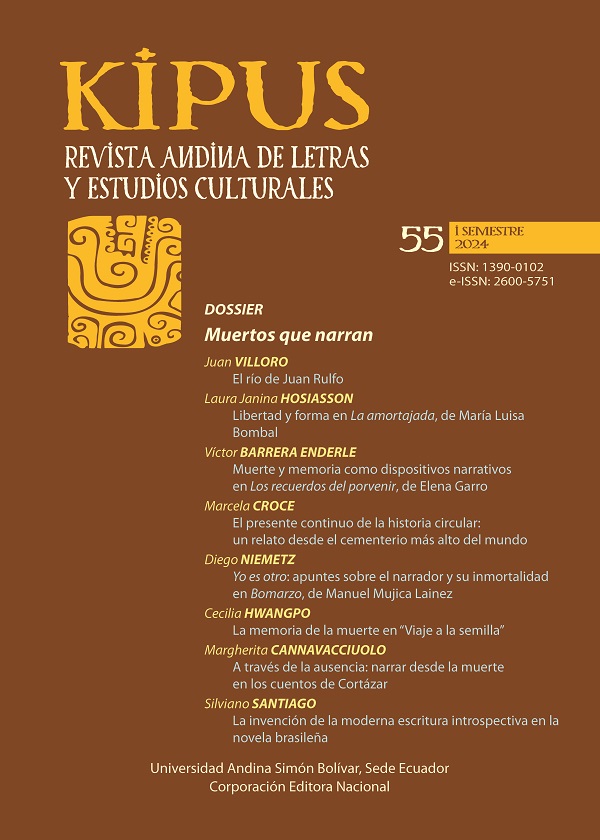I is another: notes on the narrator and his immortality in Bomarzo, by Manuel Mujica Lainez
DOI:
https://doi.org/10.32719/13900102.2024.55.5Keywords:
Autofiction, New Historical Novel, Narrator, Portrait, Artistic ExperienceAbstract
This work departs from considering the publication of Bomarzo (1962) by Manuel Mujica Lainez as a cultural milestone that imposed itself as a great challenge to the reading canons of the period. The difficulties in the reception of the book have been reflected in contemporary critical testimonies, and there is even evidence of its persistence years later. In that background, it is pertinent to analyze the configuration of the narrator, since in his specificity resides a great part of the novel's innovation. To this end, in addition to taking into account his fantastic component, we will approach the work as an autofiction that challenges the historiographical assumptions sustained, largely, by the traditional historical novel.
Downloads
References
Abate, Sandro. 2004. El tríptico esquivo: Manuel Mujica Láinez en su laberinto. Bahía Blanca: Universidad Nacional del Sur.
Alberca, Manuel. 2005-2006. “¿Existe la autoficción hispanoamericana?”. Cuadernos del CILHA 7/8: 115-33.
–––. 2007. El pacto ambiguo: de la novela autobiográfica a la autoficción Madrid: Biblioteca Nueva.
Battista, Vicente. 1963. “Bomarzo”. Reseña. El Escarabajo de Oro 20: 31-24.
Berenson, Bernard. 1905. Lorenzo Lotto: an essay in constructive art criticism. Londres: George Bell & Sons.
Buch, Esteban. 2003. The Bomarzo affair: ópera, perversión y dictadura. Buenos Aires: Adriana Hidalgo.
Caballero, María. 2000. Novela histórica y posmodernidad en Manuel Mujica Lainez. Sevilla: Universidad de Sevilla.
Colonna, Vincent. 1989. L’autofiction, esssai sur la fictionnalisation de soi en littérature. Mémoire de doctorat, EHESS.
Cruz, Jorge. 1996. Genio y figura de Manuel Mujica Lainez. 2ª ed. Buenos Aires: EUDEBA.
Hutcheon, Linda. 2000. A theory of parody: the teachings of twentieth-century art forms. Urbana and Chicago: University of Illinois Press.
Menton, Seymour. 1993. La nueva novela histórica de la América Latina, 1979-1992. Ciudad de México: Fondo de Cultura Económica.
Mujica Lainez, Manuel. 2007. Bomarzo. 9.ª ed. Buenos Aires: Debolsillo.
Niemetz, Diego. 2014. “Ramarzo-Boyuela: la recepción de Bomarzo y de Rayuela en El escarabajo de oro”. En Conversas sobre Julio Cortázar, 105-21. Porto Alegre: Armazém Digital.
Piña, Cristina. 1986. “Historia, realidad y ficción en la narrativa de Manuel Mujica Lainez”. Sur, 358-9: 173-86.
Puente Guerra, Ángel. 1994. “Un aleph en la narrativa de Manuel Mujica Lainez: Bomarzo”. Tesis doctoral,. Universidad de Maryland.
Schanzer, George O. 1986. The persistence of human passions: Manuel Mujica Lainez’s satirical neo-modernism. Madrid: Tamesis Books.
Vázquez, María Esther. 1983. El mundo de Manuel Mujica Lainez. Buenos Aires: Editorial de Belgrano.
Downloads
Published
How to Cite
Issue
Section
License
Copyright (c) 2024 Kipus: Revista Andina de Letras y Estudios Culturales

This work is licensed under a Creative Commons Attribution-NonCommercial-ShareAlike 4.0 International License.







.png)
